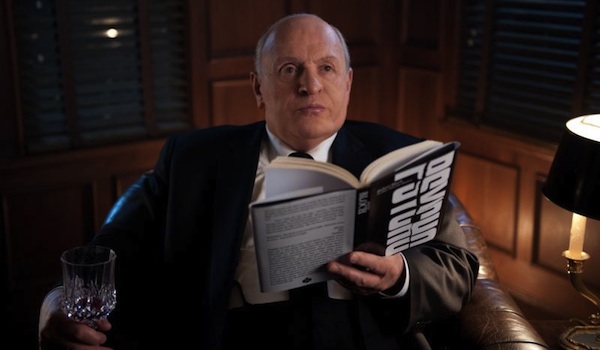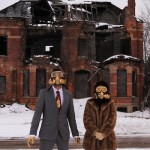Hitchcock Review
Posted on January 17, 2013 By John Gilpatrick 2012, Movie Reviews, New Releases
Hitchcock is a mostly harmless film, but it’s hard to believe there’s nothing exceptional about the film about one of the most exceptional films ever made. Cinema doesn’t get much better than Psycho, but its director’s making-of biopic is dull and lifeless. Its attempts at characterization are based largely around tall tales and innuendo, and as such, Hitchcock himself never feels like a real person. Coupled with limp humor and distracted drama, almost nothing stands out in Sacha Gervasi’s film. It’s a stinker.
Following the success of North by Northwest, Paramount is looking forward to getting Alfred Hitchcock (Anthony Hopkins) behind a camera once again. Though he certainly doesn’t lack skill, the myriad of spy screenplays (including one adapted from a book by some dude named Ian Fleming) aren’t tickling his fancy. He wants something a little darker, and he doesn’t even need to get through the entirety of Robert Bloch’s novel Psycho to know this will be his next project. He even goes so far as to purchase every copy of the book in circulation so the general public won’t be spoiled by the story’s stunning twists and turns.
Hitch’s wife, Alma (Helen Mirren), is less than enthused by Psycho; She’d much prefer he tackle a story written by her friend Whitfield Cook (Danny Huston), but she’s behind her man 100%. The same can’t be said for Paramount. They want something less twisted and dark from their moneymaker, and they promise him they won’t pay for this project. Hitch vows to finance it himself if Paramount promises to release it regardless of what the final cut looks like. So the deal is struck, and, with blonde bombshell Janet Leigh (Scarlett Johansson) at his side, Hitch got to work.
Because we know Psycho was a huge success, Hitchcock feels disappointingly anti-climactic. That needn’t be the case (see also: Zero Dark Thirty), but John J. McLaughlin’s screenplay, from minute one, feels small. There are big questions about an artist’s quest to stay relevant, but Hitchcock brushes them aside in favor of a grating infidelity subplot that goes absolutely nowhere.
Even the character of Hitchcock doesn’t feel fully formed. The voice feels right. Hitch’s eating habits are chuckle-worthy. Beyond that, this is a pale imitation of a real person—a legend that’s shaped around a character’s quirks rather than a human’s traits. Not even a pro like Anthony Hopkins can save the day. He’s okay. It’s hardly a memorable performance, but with such a rank screenplay to work with, there’s little the guy could have done.
Helen Mirren is a little better, perhaps because Alma isn’t the legend Alfred is. She says more with each wanting glance than any line of turgid, shouty dialogue thrown her way. Scarlett Johannson gets the worst shake of anyone in the cast (which also includes average-to-poor performances from Danny Huston, Jessica Biel, and Michael Stuhlbarg). She’s given so little to do that one can’t help but wonder why Gervasi and company cast a name in the role at all.
So without any thematic weight, clever story turns, or strong performances, Hitchcock must be a director’s piece, right? With a handful of the best, most innovative films of all time at his disposal, Gervasi must employ a pretty killer visual style in Hitchcock, right? Yeah, none of that is the case. Hitchcock looks as bland as it sounds, as bland as it feels. It’s a bland, bland, bland movie. Sure, it isn’t terrible, but when “not terrible” is the best you can say about a film…yeah, it’s kind of terrible.
2 Stars, 2012, Anthony Hopkins, Danny Elfman, Danny Huston, Helen Mirren, Hitchcock, James D'Arcy, Jeff Cronenweth, Jessica Biel, John J. McLaughlin, Michael Stuhlbarg, Pamela Martin, Sacha Gervasi, Scarlett Johansson, Toni Collette
















